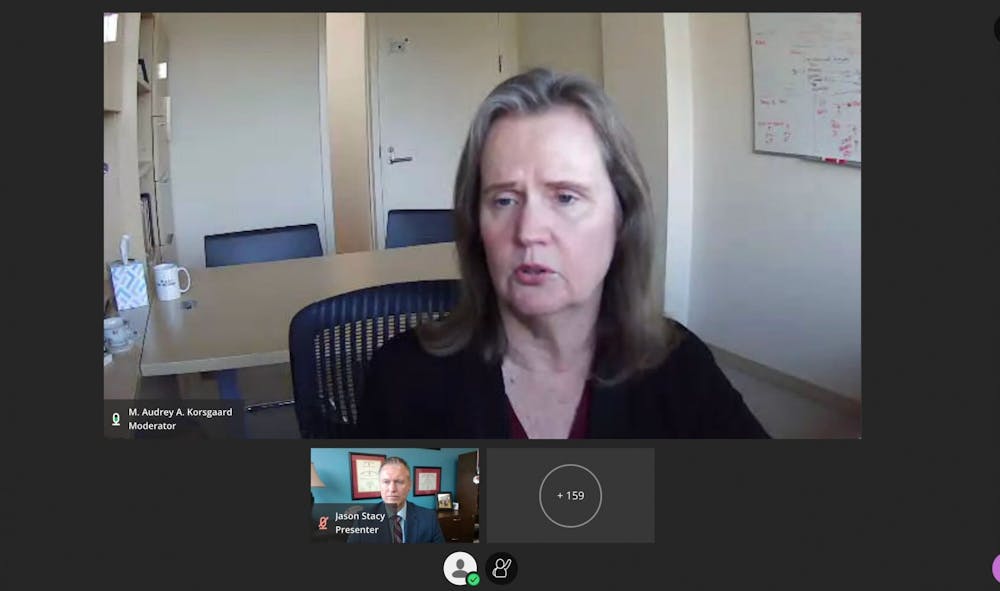Members of the faculty senate said they were frustrated with campus mask mandates not being enforced and shared concerns about pending state legislation in their virtual meeting on Feb. 2.
Dr. Jason Stacey, the interim vice President of Health and Well-Being and chief health officer, spoke about the issues with the omicron variant and the university.
The faculty expressed their concern about the university's lack of action in enforcing its mask mandates.
“I know that we have a lot of policies around campus that students should be masking, I'm feeling like that. I've also known it at the libraries and at the other locations, we have also been having problems with enforcement, because, of course, that's hard,” Kristina Schwoebel, university librarian, said.
Stacey said the university hoped to combat this problem by having more masks available. Moderator and professor of management Audrey Korgsgaard said the supply wasn’t the problem. She said it was instead the reinforcement of proper mask-wearing in classrooms.
Stacy said while the university was proud of its efforts during this surge — citing the immense testing and quick testing turnarounds by the College of Pharmacy — the university intended on putting more emphasis on contact tracing and encouraging those who are un-boosted or unvaccinated to consider doing so.
Political science professor Kirk Randazzo asked for updates surrounding pending legislation about critical race theory, tenure and increasingly pressing requests about founding documents from the Council on Higher Education (CHE).
“So first of all, if there's any doubt within the faculty senate or the broader faculty about where the university stands, let that go away," interim university President Harris Pastides said. "I'll tell you right now, as clearly as I can, that we share the same values and we are working fervently on educating, if you will, the general assembly, and the broader public on where we stand.”
Randazzo said the lack of response from the university to these concerns, which he initially made back in October, presented the university as “increasingly tone-deaf” to the faculty who are worried about their academic freedom. He said a formal statement to members of the faculty about updates surrounding this issue would help them feel like they are being heard.
The senate also discussed workplace civility after there were changes to the faculty manual. Professor George Khushf in the department of philosophy said the language of the changes was "far too ambiguous."
“Very often when people's values are challenged, this is emotionally distressing. The wording on incivility is far too ambiguous. It leaves open what counts as uncivil and makes it a function of whether call it a reasonable person feels emotionally distressed," Khushf said. "I would like to propose that this part of the revisions be sent back and that more explicit standards be articulated.”
Other faculty members said the broad language can make uncivil actions undefinable, and therefore, hard to act on. However, professor Mark Macauda disagreed.
“And just a comment first that sometimes I feel the broadness of the language also speaks to how insidious bullying can be,” Macauda said.
The faculty senate voted to send the revisions back to the committee and ended the debate.
The faculty senate also debated whether to grant full faculty voting rights to all full-time faculty. In specified areas like tenure and promotion, only a subset of the university faculty is eligible to vote.
The faculty senate discussed the wording of the proposal and the credentials of those who would be allowed to vote on certain issues.
“At the very least, this would now allow any full-time instructor with a bachelor's degree to be voting on Ph.D.-level program changes, and so, just like we have a requirement that you be tenure-track, or tenured in order to vote tenure decisions, I think a similar standard is reasonable for other types of decisions,” Christopher Yenkey, a professor in the international business department, said.
These revisions also were sent back to the committee for review.
The faculty senate finished the meeting by giving updates on the provost search that it extended until Feb. 14. They hope to have a shortlist of potential candidates by March.

